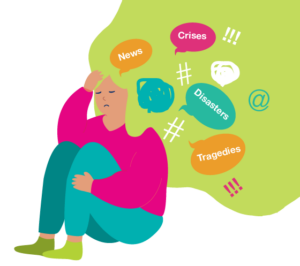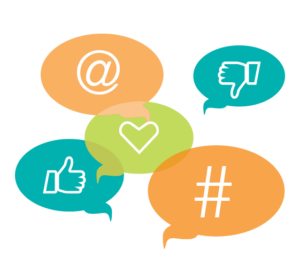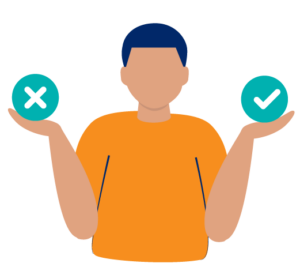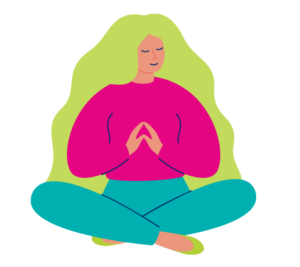We are more tuned in to world events than ever before—in fact, it can be difficult to avoid hearing and learning about what is happening across the world, in your country, or local community. Stories and headlines can be overwhelming at times, but you can take action to care for yourself and your community while you stay connected and informed.

Work towards balance
News travels fast these days and it often comes straight from the source, raw and unfiltered. Once you see or read something shocking or graphic, it stays with you and can impact your mental health and well-being even if you’re far away, witnessing it indirectly
However, completely ignoring local or world events because you are scared of encountering something upsetting is also not useful, and ignoring events is a privilege many people don’t have. If you want to be a supporter or simply a good neighbour or global citizen, it’s important to spend some time learning about major events that may not directly affect us. To help find balance:
- Check in on your mental health before you start browsing and establish boundaries based on where you are at that moment. It’s healthy to take breaks and stick to your usual routines, especially when you’re following an event from afar. Everyone has their own life experiences and experiences of traumas as well as their own capacities, resiliencies, and supports in navigating additional traumas. Avoid comparing yourself to others and remember that taking care of yourself is the only way to SAFELY stay engaged OVER long periods of time.
- Take control of what you see. Many apps and browsers have settings to stop videos from automatically playing and extensions that blur photos or prevent photos from loading until you want to see them. You can also turn off or pause notifications on your phone or other devices until you are ready to engage with the material.
- Take care of your own mental health and seek support when you need it. Talk with friends and family members and prioritize time for activities—ideally some off-screen—that help you manage stress. Check in with your community or a mental health professional if you need extra support.
- Be thoughtful about what you share and why. Are you sharing useful or important information, or are you sharing rumours? Are you connecting with others or seeking new perspectives, or are you getting into online debates that take up a lot of time and effort but accomplish very little?
Use social media mindfully
Social media platforms come with benefits, harms, and contradictions. Social media can be an excellent way to see many different
perspectives, especially from smaller groups or independent journalists who don’t have their own large platform. Disinformation and misinformation can also spread quickly on social media, and information is driven by computer formulas (algorithms) rather than reliability or usefulness.

Disinformation is false information that is spread on purpose to mislead people while misinformation is false or inaccurate information that is not spread on purpose. Disinformation and misinformation are tightly connected, and misinformation often starts as disinformation. An example is false information shared by someone for political gain (disinformation) which is then copied and shared on social media by people who believe the source to be reliable (misinformation). Disinformation can be a tool used by groups or individuals attempting to justify hatred towards others. Be cautious if you come across something that’s much more shocking or graphic than most other accounts and doesn’t seem to line up with facts you can verify.
Instead of viewing social media as all good or all bad, think of social media as a tool. It may be more helpful or less helpful, depending on the specific situation, and it’s important to use it with care—and a lot of critical thinking.

Focus on what you can do
It’s normal and expected to have strong feelings like anger or despair in the face of injustice or harm. Focusing on tangible action can help you turn difficult feelings into a positive contribution for the cause.
You could join a community group, attend an event, volunteer your time, write to politicians, talk with people about the issues, or donate to a support organization. Think about how people in your own community might be impacted and how you can support them.
Find help now
If you are feeling overwhelmed or distressed and need support, help is here for you.
- Emergency Care: Call 9-1-1 for help right away or go to your local emergency medical centre
- Suicide Crisis Helplines: For urgent mental health support 24 hours a day, text or call 9-8-8 from anywhere in Canada or call 1-800-SUICIDE (1-800-784-2433) in BC.
- BC Mental Health Support Line: For mental health support or referral, call 310-6789 (no area code) 24 hours a day.
For more resources, visit www.cmha.bc.ca/find-help

